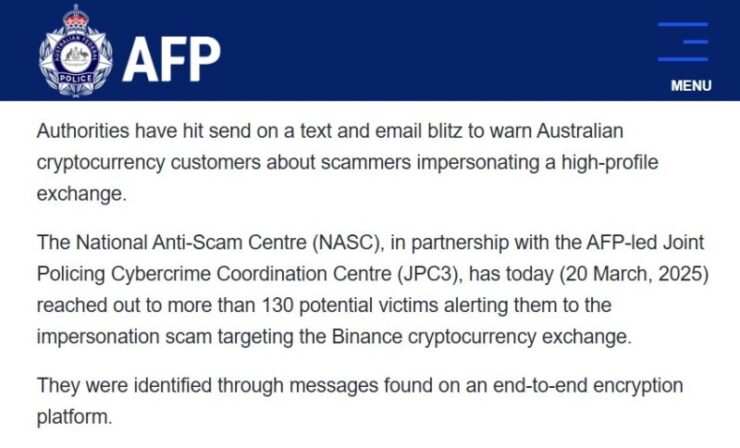Australian law enforcement has stepped up its fight against crypto fraud, focusing specifically on scammers impersonating Binance to defraud local investors. In a coordinated effort, the Australian Federal Police (AFP), National Anti-Scam Centre, and Binance Australia issued warnings after uncovering a sophisticated scheme that exploited fake communications to siphon off victims’ crypto holdings.
Authorities revealed that more than 130 potential victims had already been identified and alerted. The scammers sent deceptive messages—via SMS and encrypted messaging platforms—that appeared to come from legitimate Binance communication threads. These messages claimed users’ accounts were compromised and urged them to act immediately.

Victims were tricked into calling a fake customer support number embedded in the message. On the call, the fraudsters posed as Binance representatives and convinced users to transfer their crypto assets to a so-called “trust wallet” for safekeeping. In reality, the wallets were controlled by the scammers, resulting in the loss of the victims’ funds.
The AFP and Binance Australia have urged users to remain vigilant, emphasizing the importance of verifying any unsolicited messages and never transferring funds based on unverified instructions.
Operation Firestorm Uncovers Global Scam Network
The discovery of the Binance impersonation scam was part of a broader international crackdown dubbed Operation Firestorm—a coordinated initiative launched last year to dismantle transnational crime syndicates using digital fraud to target Australian citizens.
Through close collaboration with global law enforcement partners, the Australian Federal Police (AFP) traced the fraudulent network’s activities across borders, revealing how these scams were meticulously orchestrated.
However, once victims transferred their cryptocurrency, the funds were swiftly laundered through a tangled web of wallets and anonymizing channels, making recovery efforts extremely difficult.
The perpetrators leveraged advanced crypto laundering techniques, including rapid asset movement across multiple wallets and conversion into privacy coins, effectively obscuring the digital trail.
In their public advisory, authorities urged victims to immediately contact their financial institutions or crypto platforms to attempt account freezes and report incidents via Australia’s ReportCyber portal, referencing the case number AFP-068 for streamlined investigation processing.
Meanwhile, Binance Australia, though cooperating fully with law enforcement to dismantle the scam, is also grappling with its own regulatory hurdles. In December 2024, the Australian Securities and Investments Commission (ASIC) initiated legal action against Binance Australia Derivatives, accusing the exchange of misclassifying retail investors and failing to provide adequate consumer protections.
Law Enforcement Ramps Up Anti-Scam Measures
In response to the growing number of cases, Australian authorities are enhancing their surveillance and enforcement capabilities. The Australian Federal Police (AFP) and financial watchdogs have begun coordinating efforts to trace and dismantle these fraud networks while also collaborating with international partners to track illicit fund transfers.
The ACCC’s Scamwatch division reported a noticeable uptick in crypto-related scams over the past year, prompting calls for tighter regulations and increased public awareness campaigns to combat the problem.
Authorities are also urging exchanges and payment providers to strengthen their verification processes and proactively flag suspicious activities.
Quick Facts:
- Australian authorities uncovered a scam targeting users through fake Binance communications, impersonating the exchange to steal crypto funds.
- Over 130 potential victims have been identified and warned as part of the crackdown.
- Scammers used fake SMS and encrypted messages to direct victims to a fraudulent customer support number, leading them to transfer funds to wallets controlled by the fraudsters.
- Law enforcement urges users to verify all unsolicited messages and avoid transferring funds without proper verification.





